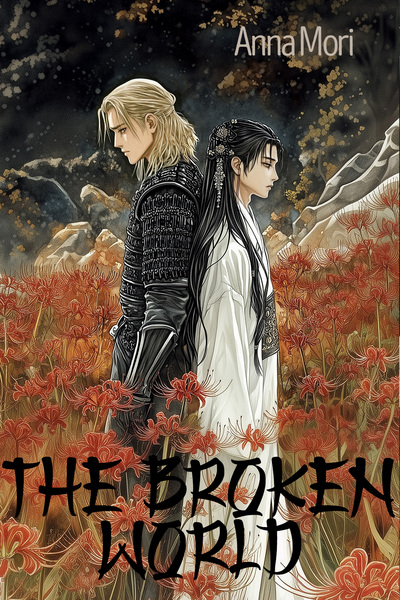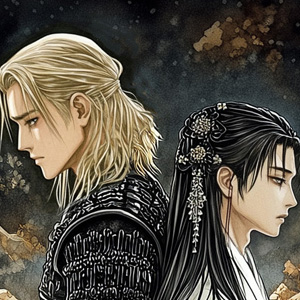The feast held in the Pavilion of Joy in their honor was nothing short of magnificent. One dish after another was brought in by an endless procession of servants. Gerel, hardened by a childhood of hunger, had a deeply ingrained habit of finishing everything on his plate. At first, he tried to do just that, but it quickly became clear that such efforts were futile — and this realization irritated him.
All the tableware was made of silver. At first, he was surprised by such luxury in a nation that had until recently languished in poverty. Then it struck him: this might be a gesture, meant to show them that the food was free of poison. Silver was said to tarnish in the presence of toxins. A ridiculous superstition — he knew of many poisons that left no trace on any kind of plate. Still, the choice of silver struck him as a poor omen. While meant as a peaceful gesture, the very act of demonstrating the food's safety hinted at an underlying tension in their relations.
Translators were present at the feast, so everyone spoke their own language. Even so, conversations with the locals were brief and awkward. Gerel's companions quickly grew weary of feigned politeness, eventually ignoring the Ryukokans entirely and speaking mostly among themselves.
The emperor himself was absent. Not long ago, Gerel would have taken this as an insult. Now he understood that the emperor here was regarded as something akin to a living god, rarely descending to mingle with mortals. His absence was no sign of disrespect; it was simply the way things were. Perhaps ordinary people weren't even allowed to see him eat.
In a way, there was logic to it. At the lavish but far less restrained banquets of Tokhung, those few who managed to keep their wits about them often found themselves wondering how much longer the empire could endure. Overindulgence — gorging, drinking, and debauchery — left imperial hands too feeble to hold the scepter of power for long. And who would dare question a living god, especially one whose face wasn't even seen uncovered?
Serving girls danced and played the erhu for the guests. They were painfully delicate, their faces thickly powdered white, with thin charcoal brows painted far above where they naturally belonged. Every detail of their appearance exuded artificiality. Gerel noted that he hadn't seen any court women at the banquet, confirming the rumors that they lived in their own part of the palace, secluded from the affairs of men.
He tried to imagine Jin-ho in such a palace — Jin-ho, fiery and blunt, with her sharp tongue and fearless demeanor — and failed. The thought was as absurd as picturing a steel spear growing among delicate irises in a garden.
One mustn't forget, Gerel reminded himself, that beneath the Yuigui-inspired veneer lay a culture entirely its own, one that was neither Yuigui nor Cheongju. It would not be easy to find common ground with them.
After dinner, Gerel wandered the palace, observing its inhabitants. However, in the pavilion designated for guests, there was little of interest to see. To venture elsewhere without cause would have been impolite — and likely dangerous.
Eventually, he ventured into the garden. Unlike the meticulously symmetrical Yuigui parks, this garden was arranged with a studied carelessness. Pavilions, paths, and bridges were placed in ways that seemed natural yet deliberate. As dusk fell, paper lanterns began to light up one by one, resembling giant fireflies scattered throughout the garden.
After wandering for some time, Gerel unexpectedly came upon the emperor.
The emperor sat in one of the gazebos, drinking tea. He wore a robe of twilight blue and purple — simple compared to his ceremonial attire, though still, in Gerel's opinion, far too ornate and impractical, with sleeves so long they nearly brushed the ground like wings. A few servants stood nearby, their silence and poise betraying their role as bodyguards, despite the absence of visible weapons.
Yukinari's hair, free of braids and the multitude of pins that usually adorned it, was tied back with a simple silk ribbon. To drink his tea, the emperor had once again removed the ever-present veil from his face. In the solitude of the moment, his features seemed melancholy. Gerel suddenly realized that in his twenty-some years, this young ruler had likely known very little joy.
He considered slipping away unnoticed, but his presence did not go undetected.
"You haven't come to kill me, have you?" the emperor said in Yuiguian, a faint smile tugging at his lips.
Gerel hurriedly bowed, feeling an odd twinge of guilt for the sword at his side.
"In that case," Yukinari continued, "allow me to offer you tea, General. Please, sit and make yourself at ease."
"It would be a great honor," Gerel replied, also in Yuigui's tongue.
How strange, he thought, that this language, foreign to them both, had become a thread connecting them.
And yet, was it truly foreign? Once again, Gerel marveled at how naturally the words flowed from Yukinari's lips.
He bowed respectfully to Yukinari once more, unfastened his sword, and set it aside at a careful distance. A reckless gesture, perhaps, but he knew full well he had no right to keep it on him here. Then, he seated himself at the low tea table across from the emperor.
One of the servants slipped into the shadows of the garden, silent as a phantom, and returned a few minutes later with a second teacup, which he placed before Gerel before filling it.
A delicate, creamy aroma of dark, well-roasted oolong wafted up to him. It had been years since he'd last tasted good tea. The porcelain was so fine that the golden liquid shone faintly through it. A beautiful cup. Such craftsmanship did not exist in Cheongju. In Yuigui, of course, they made cups of extraordinary quality, but their style tended toward the ornate — bright colors, intricate patterns, gilded edges. This cup, by contrast, was simple: solid dark blue porcelain with an understated relief of leaves and grasses. An autumnal cup, paired with an autumnal tea.
Master Ling had always said: in winter, one drinks black tea; in spring, floral infusions; for summer, there are bright, cooling green teas; but for autumn — aromatic, smoky oolong, meant for contemplation...
Gerel drank in silence, savoring the tea. The emperor sat just as quietly, resting his chin on his interlaced fingers, watching him with the same intense, earnest curiosity he had shown at their first meeting. Somehow, the shared silence felt natural, unburdened by awkwardness. Yet, propriety dictated that such silence could not be allowed to stretch too long. Gerel began searching for an appropriate topic for small talk. At the very least, he ought to apologize for intruding on Yukinari's evening solitude, and so he did.
"I appreciate your attempt at decorum, General. Shall we discuss the weather?" Yukinari responded with a wry smile.
"The weather is so pleasant there's hardly anything worth saying about it," Gerel replied coolly, unsure whether to take offense at the emperor's humor.
The weather truly was remarkable: the oppressive heat had finally lifted (or perhaps summers here in Shinju were mild to begin with). Aside from the deepening blue of the sky and the coolness of the nights, there were few signs of autumn's arrival. Gerel loved autumn. In a month, the cold northern winds would blow, rains would come, and the spider lilies — flowers of the dead — would bloom along the fields. The bright pink berries of the spindle trees would hang heavy on their branches. A couple of weeks later, the maples would turn red, and the imperial palace would look like something out of a painted porcelain scene.
But to speak of such things aloud seemed foolish — an inevitable descent into sentimentality. Worse still would be saying such things to a man who surely thought him a barbarian.
So instead, he voiced the thought that had been turning in his mind since their first meeting, though he wasn't sure if it was an appropriate topic.
"I noticed that you speak the High Speech very fluently," he said.
"Yuigui is my second native tongue," Yukinari replied, "or perhaps even my first. I lived in Yuigui from the day I was born until I turned eleven. My mother was from there."
Of course. Gerel recalled the start of that story from his history lessons, though it hadn't occurred to him to connect it to the young man before him. A quarter-century ago, the long war between Yuigui and Ryukoku had ended. Yukihito, Yukinari's father-to-be, had been the crown prince of Ryukoku. After his nation's defeat, he had been sent to the Land of Tortoise as a political hostage. They had found him a wife from one of Yuigui's noble families, but that had not made him any less of a prisoner. His son, born on foreign soil, must have been just as much a captive. Poor child. To spend one's childhood among strangers who despised you — that was no enviable fate.
"I know about your parents," Gerel said awkwardly, aware that he was failing to steer the conversation with any grace.
He saw that Yukinari understood the thoughts behind his words, but the emperor's serene, elegant face betrayed no hint of offense or anger.
"I was surprised to hear that you know this language," Yukinari said, his tone warm and free of mockery.
"I spent some time living and studying in Baijing," Gerel explained. "I had to learn to understand the High Speech well. My esteemed Emperor Tokhung wanted me to study military science there."
Strictly speaking, it had been less of an imperial order and more of Gerel's own ambition. And in truth, he hadn't learned much about military science at Ling-tsu Academy. Yet he had never regretted those years spent in Yuigui.
When sixteen-year-old Gerel first saw the capital of Yuigui, its people, its culture, and its ways, he was awestruck. The Land of Tortoise... It felt as though he had stepped into a dream or into one of the peaceful, happy lands from his mother's bedtime stories. Everything seemed strange and endlessly foreign when he first arrived at Ling-tsu Academy. The kindness of Master Ling and the other students filled him with fear and suspicion — or, worse, with shame. He felt exactly as a boy who had known nothing in life but violence, poverty, and war should feel when suddenly thrust among well-fed, beautifully dressed, educated people who spoke earnestly about such impractical and useless matters as the movement of celestial bodies, the fate of humanity, history, and philosophy.
In time, he adapted, grew used to it, even learned to talk about lofty subjects himself. He never truly became one of them, of course. But the iron grip that had clenched his heart since his mother's death seemed to loosen, if only slightly. For the first time, he wondered if perhaps there was something in life worth living for beyond survival and revenge...
That thought, however, didn't linger long. Master Ling — a gentle, infinitely patient man with a soft, even voice and a deep scar across his throat — never managed to erase Gerel's deeply ingrained cruelty, a trait entirely unbecoming of a true intellectual, a man of Yuigui. Gerel only knew how to wage war. Soon enough, he returned to Cheongju, and within a few years, he stood at the head of an army, waging war against the very country he had come to love.
He never quite knew what to call his homeland. He was born in the South, came of age in the West, and yet his heart belonged most of all to the North — a place he wanted to despise for its decadence and pride but simply couldn't. He saw too clearly how good life was for its people.
As for the East, it remained a mystery to him for a long time. He prayed he wouldn't grow to love it too; soon enough, Ryukoku would have to be his enemy as well, though that war would no longer be his choice to make.
"Why did you choose to study the art of war?" Yukinari asked him.
"I was a soldier. I doubt I could have become anything else."
"That sounds... sad."
"'Good iron is not made into nails,'" Gerel replied with a faint, bitter smile, quoting the opening of a well-known Yuiguian proverb: Good iron is not made into nails, nor worthy men into soldiers.
"But in your country, the military is held in higher regard, isn't it?" Yukinari said, conciliatory.
Gerel remained silent. Sad? Yes, perhaps. Rarely does a man join the army because life is good, no matter how honorable the service might be.
"You speak well," the emperor noted, seemingly unbothered by Gerel's furrowed brow. "Sometimes, though, you pronounce words a little too precisely — like you're trying too hard. Still, I haven't spoken Yuiguian with anyone in ages. It's a pleasure to hear it again."
"It's strange to hear you speak so warmly about the Land of the Tortoise, given how long your nations were at war. You ought to hate it."
Yukinari frowned slightly, raising a hand to his temple as if searching for the right words, before answering with unexpected candor:
"I find it difficult to hate Yuigui — it surpasses Ryukoku in so many ways. I grew up there, almost as a prisoner, and I remember yearning as a child for Ryukoku, for an imagined homeland I'd never seen. But when I finally came here, I didn't like what I found. By then, Yuigui had made me one of its own... I sometimes wonder: if Yuigui were to seek to conquer my country again and war broke out, what would I do? My heart is Yuiguian, but by fate, my country is Ryukoku. I can never feel whole again. I often envy those who are truly devoted to their homeland. People need to feel part of something greater than themselves."
It was as though he had read Gerel's mind, for the general had been thinking much the same thing just moments ago.
"Such devotion is just self-delusion," Gerel replied bluntly. "Most people who shout loudest about their love for their homeland have seen nothing beyond their own village — and they don't want to see anything else. The fact that someone was born in the same country as you means nothing. What matters is what's in a person's head and heart."
"But how many people can claim they truly have something there?" Yukinari countered. "And even if they do, how many have the audacity to place themselves above others, above the land where they were born?"
Gerel shifted uncomfortably, slightly unsettled.
"Forgive me," he said. "I didn't mean to offend..."
The emperor smiled.
"It's nothing. You're very forthright, and I've missed having someone like you to talk to. Here at court, bluntness is far from welcome."
Perhaps it was politeness, but Gerel thought there was some truth in the emperor's words. The imperial court of Ryukoku was the pinnacle of decorum, where breaking the rules of etiquette was unthinkable, and every word and gesture had to be carefully measured. Given Ryukoku's long near-isolation from the outside world — Yuigui aside — Yukinari likely had few opportunities to converse so openly with a "barbarian" who spoke his mind and asked uncomfortable questions.











Comments (0)
See all